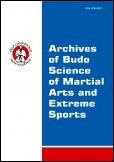2021, Volume 17, Issue 1
Fundamental philosophy of Bushido for special education for persons with intellectual disabilities through Kigatsuku and Zanshin Spirit
Ryo Takahashi1
1Sendai University, Shibata, Japan | International Association for the Scientific Study of Intellectual and Developmental Disabilities | The Nippon Care-Fit Education Institute, Tokyo, Japan
Author for correspondence: Ryo Takahashi; Sendai University, Shibata, Japan | International Association for the Scientific Study of Intellectual and Developmental Disabilities | The Nippon Care-Fit Education Institute, Tokyo, Japan; email: ro-takahashi@sendai-u.ac.jp
Full text
Abstract
This scientific essay is introduction of the philosophy of Bushido for not only teaching for persons with intellectual disabilities, but also aging people in various setting. The study of aging people is generally include within gerontology. Gerontology is characterized interdisciplinary, multidisciplinary, and internationally. Kigatsuku means “an inner spirit to act without being told what to do”. SOUL can be grown by See, Observe, Understand, and Listen to learn each other. Zanshin is also central philosophy of Bushido. Zanshin is to polite to others with humble heart to express thanks. Zanshin is a way of learning from everybody to grow oneself and going back to basic principle mind. On March 3, 2007, the International Gerontology Synthesis Meeting, sponsored by the Care-Fit Service Association in Okinawa, Japan, issued the Okinawa Proclamation on Respect for Aging. This proclamation is made in support of the Da Vinci Project, which is a universal approach that recognizes the importance of all age groups accepting the dignity and value of older adults.
Key words: Bushido, Da Vinci Project, gerontology, judo, practical pedagogy





